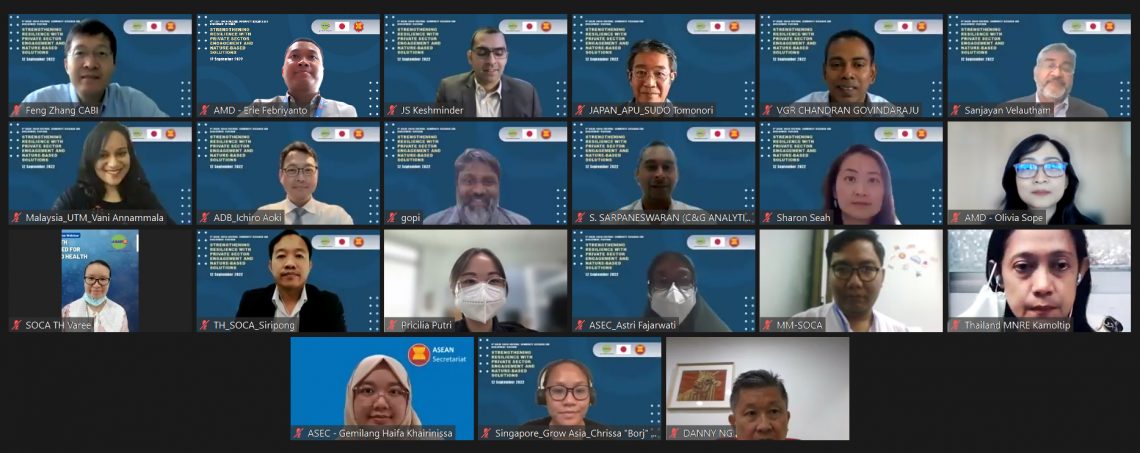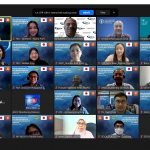ASEAN strengthens climate resilience through private sector engagement towards nature-based solutions

JAKARTA, 12 September 2022 – Experts and participants of the “Strengthening Resilience with Private Sector Engagement and Nature-based Solutions” webinar called for increased awareness, cross-sectoral synergies, integrated local knowledge and science, and appropriate institutional arrangements to mainstream the Nature-based Solutions (NbS) concept into policies and implementation.
The event was the fourth instalment of the webinar series under the ASEAN Socio-Cultural Community (ASCC) Research and Development Platform Programme supported by the Japan-ASEAN Integration Fund.
In his opening remarks, Deputy Secretary-General of ASEAN for the ASCC, Ekkaphab Phanthavong, highlighted that ASEAN will continue to bear the brunt of extreme climate events, and its impacts have been worsened by high poverty rates and dependency on climate-vulnerable sectors such as agriculture.
ASEAN’s climate-resilient pathways require engagement with all stakeholders at all levels to deepen and fast-track efforts to mitigate and adapt to climate change as well as to embrace sustainability in the development of the region.
The first session focused on Strengthening Private Sector Engagement in Climate Change Initiatives in ASEAN. The Southeast Asia Climate Outlook Survey 2022 strongly reaffirms the importance of private sector in climate actions.
“Setting goals and committing to net zero carbon, investment in research and development, and providing green investment and financing are what the private sector can contribute to help achieve climate goals” said Sharon Seah Li-Lian from ISEAS-Yusof Ishak Institute.
However, challenges faced by the private sector remain: limited understanding of climate risks, lack of data, long payback period, and lack of financially viable projects with climate resilience elements are among them.
Ichiro Aoki from the Asian Development Bank in Manila warned that climate change is occurring faster and more intense than predicted. He said “the region cannot slow down its climate measures and more efforts should be made for adaptation than mitigation in the immediate future.”
Professor Tomonori Sudo from Ritsumeikan Asia Pacific University elaborated that new business models and partnerships are needed to address climate change mitigation and adaptation in Southeast Asia.
Aligning Priorities with NbS and Opportunities was the second focus of the session of the webinar. NbS encompasses a suite of actions or policies harnessing the power of nature to address most pressing environmental, societal, and economic issues. “The concept has evolved over time, hence the formulation of climate interventions adopting NbS should consider the current challenges to make meaningful impacts”, said Dr. Kogila Vani Annammala of Universiti Teknologi Malaysia. Incorporated thoughtfully along local knowledge and science, it could bring benefits for planet, people, and business.
Food security, a sector crucial to ASEAN development, is among sectors predicted to be severely impacted by climate change. According to Dr Feng Zhang from the Centre for Agriculture and Bioscience International, while agriculture, forestry, and fishing are the largest contributing to climate change in Southeast Asia, NbS adoption in these sectors are lacking.
Although the region experienced deficit in oil-crop seed (compared to Europe, North America, and South America), it also experienced increased in vegetable oil demand during the early phase of the COVID19 pandemic.
“This is predicted to triple by 2050 (500 million tonnes) compared to 2014 figure (150 million tonnes), creating opportunities for the region to climb the ladder of global added-value chain” said Dr Jean-Marc Roda of CIRAD. This will finance the sustainability of ASEAN’s tropical production system for NbS.
The discussion series provided insights for ASEAN to strengthen engagement with private sector to mainstream and implement NbS approach in the region.
Dr Sanjayan Velautham from C&G Analytica, highlighted awareness, good regional cooperation, cross-sectoral collaboration, and financing are key to mainstream and implement NbS in the region. An important highlight was on the financing criteria to facilitate increased participation of NbS implementers on the ground.
Representatives from the ASEAN sectoral bodies on environment and business advisory, as well as UN Global Compact, World Wide Fund Malaysia, private sector, think tanks, and universities were among those who attended the event.
 |
 |
 |






